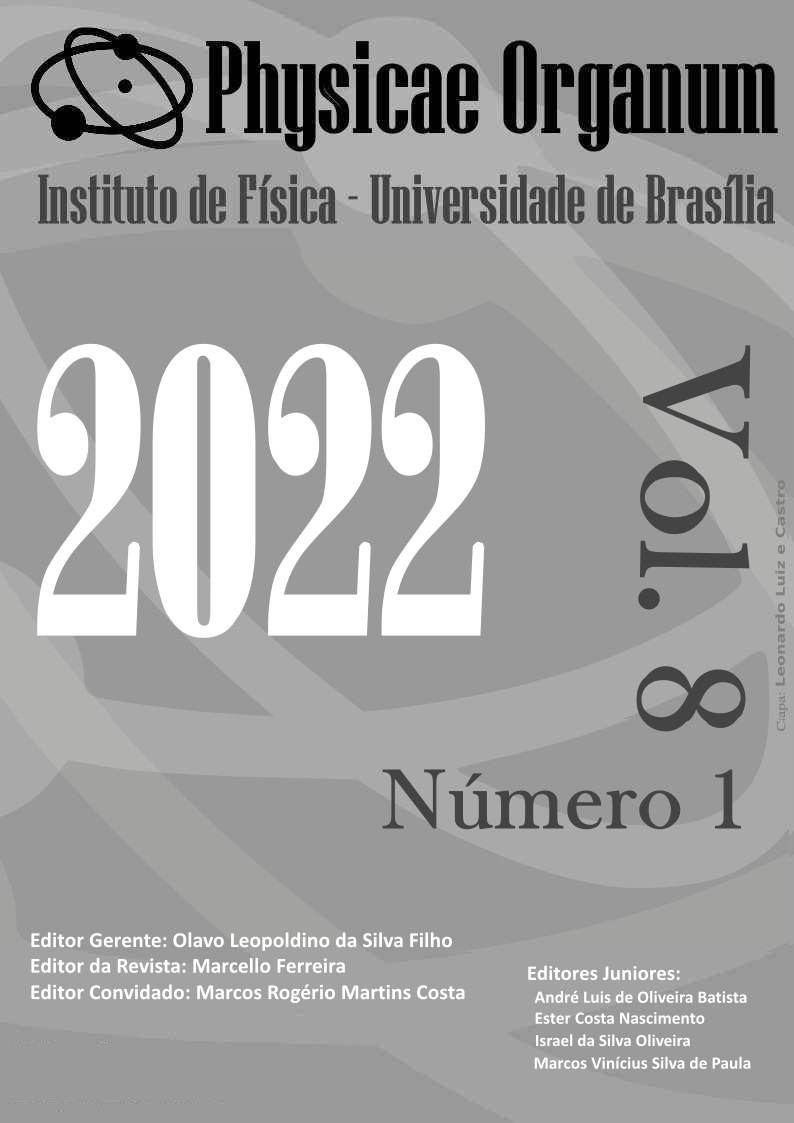AN INVESTIGATIVE TEACHING APPROACH ABOUT THE GREENHOUSE EFFECT IN ELEMENTARY SCHOOL
DOI:
https://doi.org/10.26512/2446-564X2022e42278Keywords:
Teaching by Researching Methodology, Meaningful Learning, Elementary School, Greenhouse EffectAbstract
This present work analyzes the application of the sequence by researching methodology in Science classes as a way of surmounting mechanical teaching and offer changes in the role of the teacher and the student. This approach aims to make the student a protagonist in the construction of scientific knowledge and the teacher as a mediator on this path to scientific literacy, enabling the development of cognitive skills and abilities expected by the Common National Curriculum Base. The objective is to analyze the Teaching by researching sequence through the Greenhouse effect theme in 9th grade Science classes at a public school, located in Ceilândia – DF. The implementation was made with the help of digital tools, while the research classes took place in remote teaching, due to the new coronavirus pandemic and it was a qualitative translational approach. This study draws on a theoretical framework based on the meaningful learning of Ausubel and the teaching by researching methodology put forward by Carvalho, Zompero and Laburú. The application of the sequence in Science classes, showed the understanding of the theme by the students, based on their previous knowledge, and the awareness of making changes possible in their habits in order to reduce greenhouse effect gas emissions.
Downloads
References
A FÍSICA por trás das mudanças climáticas. Scientific American Brasil, 2020. Disponível em: https://sciam.com.br/a-fisica-por-tras-das-mudancas-climaticas. Acesso em: 27 nov. 2021.
BACICH, L.; MORAN, J. Metodologias ativas para uma educação inovadora: uma abordagem teórico-prática. Porto Alegre: Penso, 2018.
BORGES, A. T. Novos Rumos para o laboratório escolar de ciências. Cad. Brás. Ens. Fís., v. 19, n. 3, p. 291-313, dez. 2002. Disponível em: http://c10.unb.br/c10/pluginfile.php/12294/mod_resource/content/1/Texto%20Atividade%203.pdf. Acesso em: 25 fev. 2021.
BRASIL. Ministério da Educação. Base Nacional Curricular Comum. Ensino Fundamental. Brasília: Conselho Nacional de Educação, 2017. Disponível em: http:// basenacionalcomum.mec.gov.br/abase. Acesso em: 20 out. 2021.
CARVALHO, A. M. P. Ensino de Ciências por Investigação: Condições para Implementação em Sala de Aula. São Paulo: Cengage Learning, 2013.
CARVALHO, A. M. P. Fundamentos Teóricos e Metodológicos do Ensino por Investigação. Revista Brasileira de Pesquisa em Educação em Ciências, [S. L.], v. 18, n. 3, p. 765–794, 2018. Disponível em: https://periodicos.ufmg.br/index.php/rbpec/article/view/4852/3040. Acesso em: 30 maio 2021.
LUNARDI, L.; RAKOSKI, M. C.; FORIGO, F. M. (orgs). Ferramentas Digitais para o Ensino de Ciências da Natureza. Bagé, RS: Faith, 2021.
MOREIRA, M. A. O que é Aprendizagem Significativa? Aula Inaugural do Programa de Pós-Graduação em Ensino de Ciências Naturais, Instituto de Física, Universidade Federal do Mato Grosso, Cuiabá, MT, 23 de abril de 2020. Aceito para publicação, Qurriculum, La
Laguna, Espanha, 2012. Disponível em: https://pt.scribd.com/document/360260580/Oque-e-afinal-aprendizagem-significativa-pdf. Acesso em: 16 fev. 2021.
MUNFORD, D.; LIMA, M. E. C. C. Ensinar ciências por investigação: em quê estamos de acordo? Revista Ensaio Pesquisa em Educação em Ciências, Belo Horizonte, v. 9, n. 1, p. 89-111, 2007. Disponível em: https://www.scielo.br/pdf/epec/v9n1/1983-2117-epec-9-01-
pdf. Acesso em: 27 mar. 2021.
NELLES, D.; SERRER, C. Mudança Climática: os fatos como você nunca viram antes. Rio de Janeiro: Sextante, 2020.
SASSERON, L. H. Interações discursivas e investigação em sala de aula: o papel do professor. In: CARVALHO, A. M. P. (org.). Ensino de ciências por investigação: condições para implementação em sala de aula. São Paulo: Cengage Learning, 2013. p. 40-61.
SENNA et al. Metodologias ativas de aprendizagem: elaboração de roteiros de estudos em “salas sem paredes”. In: BACICH, L.; MORAN, J. (org.). Metodologias ativas para uma educação inovadora: uma abordagem teórico-prática. Porto Alegre: Penso, 2018.
ZOMPERO, A. F.; LABURÚ, C. E. Atividades investigativas para as aulas de ciências: um diálogo com a teoria de aprendizagem significativa. 1. ed. Curitiba: Appris, 2016.
Downloads
Published
How to Cite
Issue
Section
License
Copyright (c) 2022 Physicae Organum

This work is licensed under a Creative Commons Attribution-NonCommercial-ShareAlike 4.0 International License.
Autores que publicam nesta revista concordam com os seguintes termos:
- Autores mantém os direitos autorais e concedem à revista o direito de primeira publicação, sendo o trabalho simultaneamente licenciado sob a Creative Commons Attribution License o que permite o compartilhamento do trabalho com reconhecimento da autoria do trabalho e publicação inicial nesta revista.
- Autores têm autorização para assumir contratos adicionais separadamente, para distribuição não-exclusiva da versão do trabalho publicada nesta revista (ex.: publicar em repositório institucional ou como capítulo de livro), com reconhecimento de autoria e publicação inicial nesta revista.
- Autores têm permissão e são estimulados a publicar e distribuir seu trabalho online (ex.: em repositórios institucionais ou na sua página pessoal) a qualquer ponto antes ou durante o processo editorial, já que isso pode gerar alterações produtivas, bem como aumentar o impacto e a citação do trabalho publicado (Veja O Efeito do Acesso Livre).




